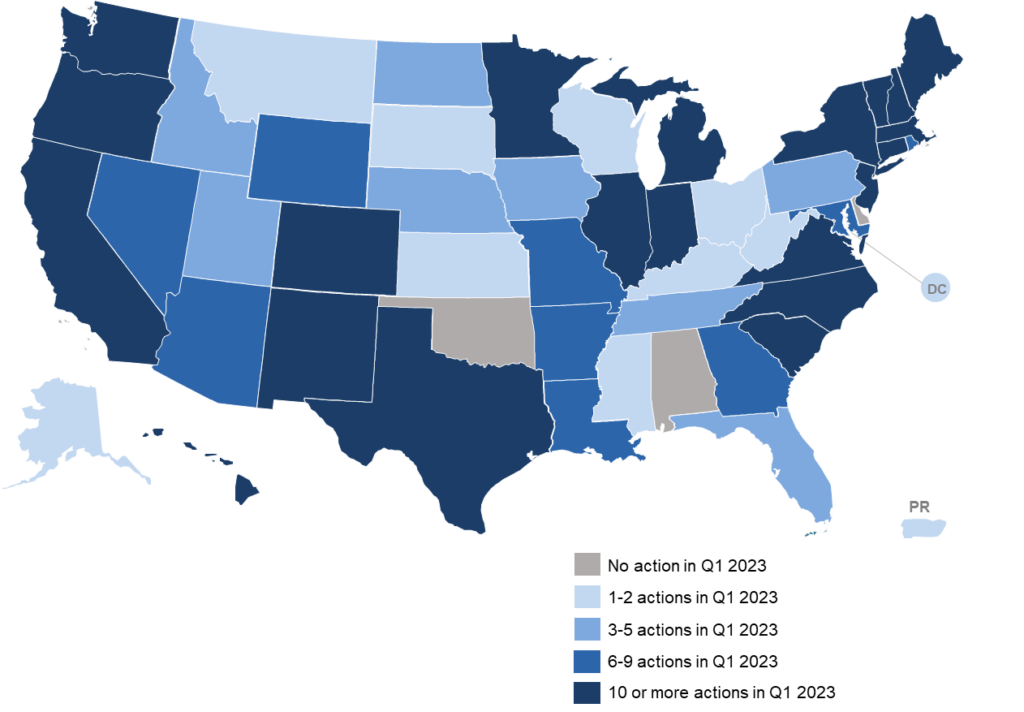NC Clean Energy Technology Center Launches New 50 States of Power Decarbonization Report Series
Raleigh, NC – (May 16, 2023) The N.C. Clean Energy Technology Center (NCCETC) launched a new policy tracking report series today entitled The 50 States of Power Decarbonization, releasing its inaugural Q1 2023 edition today. The new quarterly series provides updates on state and utility actions pertaining to clean energy targets, emission reduction targets and carbon policies, generation planning and procurement rules, integrated resource plans, and electric generation capacity changes (RFPs, green tariffs, power plant retirements, etc.).
“Electricity is currently the second largest emitting sector in the U.S., and with efforts advancing to electrify transportation, buildings, and industrial processes, the impact of power sector decarbonization is amplified,” said Autumn Proudlove, Associate Director of Policy & Markets at NCCETC and lead author of the report. “The 50 States of Power Decarbonization tells the story of where we are now, where we want to go, and where we are actually going in terms of decarbonizing the electric power sector by connecting the threads of state clean energy policies and utility resource planning and procurement.”
Q1 2023 Action on Power Decarbonization and Resource Planning

The Q1 2023 report finds that 47 states, as well as the District of Columbia and Puerto Rico, took a total of 418 actions related to electric power decarbonization and resource planning during the quarter (see figure above). Among integrated resource plans recently filed or under review by regulators in Q1 2023, planned capacity additions totaled 74,231 MW for solar, 47,662 MW for wind, 33,273 for storage, and 14,951 for natural gas, while planned coal retirements totaled 27,285 MW.
The report discusses three trends in power decarbonization actions taken in Q1 2023: (1) solar, wind and battery storage dominating planned capacity additions; (2) policymakers increasing existing clean energy targets; and (3) regulators exploring the coordination of multiple planning processes.
“The Inflation Reduction Act (IRA) – enacted in August 2022 – has given states and utilities a fortified signal of support for the next ten years, with significant financial reinforcement flowing into decarbonization efforts,” observed Justin Lindemann, Policy Analyst at NCCETC. “Power decarbonization is actively being considered by policymakers and regulators in almost every state, and there are already plans to procure new clean energy resources and increase existing clean energy targets in the new era of the IRA.”
The report notes the top five policy developments of Q1 2023 were:
- Minnesota lawmakers adopting a 100% clean energy standard;
- PacifiCorp filing its 2023 integrated resource plan covering its service territories in six western states – California, Idaho, Oregon, Utah, Washington, and Wyoming;
- New Jersey’s Governor signing an executive order setting a clean energy goal of 100% by 2035;
- The North Carolina Governor’s Office releasing its deep decarbonization study; and
- Utah and Wyoming lawmakers enacting legislation to preserve coal-fired generation.
“We are excited to release this inaugural edition of the 50 States of Power Decarbonization for our readers. Decarbonization is a critical task for the power sector for the foreseeable future as the energy transition progresses,” said Steve Kalland, Executive Director at NCCETC. “This new report series will fill a gap in our previous analysis work by focusing on a primary driver of this energy transition – a process that will change the face of the energy sector and the overall economy for decades to come.”
View the Inaugural 50 States of Decarbonization 2023 Q1 Executive Summary
View the 50 States of Decarbonization 2023 Q1 update FULL Report – (FREE for Q1 Inaugural Report)
View the 50 States of Decarbonization 2023 Q1 update Maps
View other 50 States Reports – Solar, Grid Modernization and Electric Vehicles
ABOUT THE N.C. CLEAN ENERGY TECHNOLOGY CENTER
The N.C. Clean Energy Technology Center, as part of the College of Engineering at North Carolina State University, advances a sustainable energy economy by educating, demonstrating and providing support for clean energy technologies, practices and policies. It serves as a resource for innovative, sustainable energy technologies through technology demonstration, technical assistance, outreach and training. For more information about the Center, visit: http://www.nccleantech.
Media Contact: Shannon Helm, NCCETC, shannon_helm@ncsu.edu